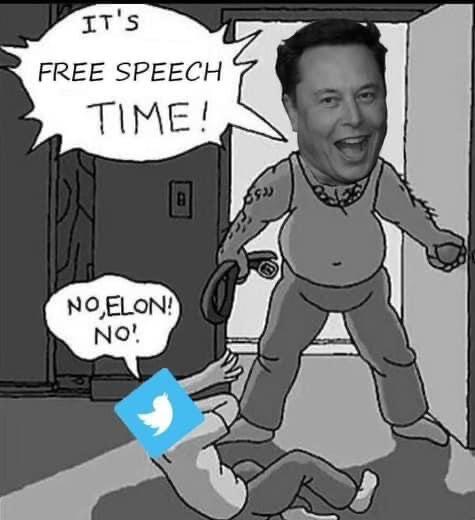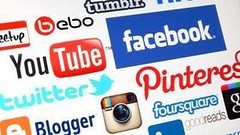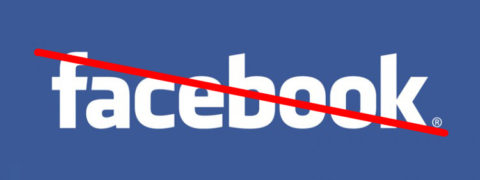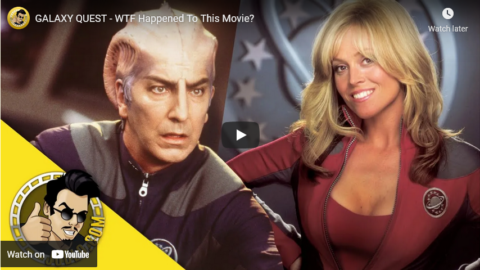I’ve written elsewhere of how much we would have suffered if AT&T had run the phone network with a Google strategy. You wouldn’t be able to talk on the phone until you heard a bunch of advertisements first. The restaurant you call for a dinner reservation would have to kickback a share of your meal tab to the phone company. Everything you did on your phone would be more cumbersome and less efficient.
Guess what? That still may happen. The only reason Apple hasn’t already started force-feeding ads on your iPhone is a fear that competitors may not do the same — and they might lose a few market share points. But all it takes is one backroom meeting of dubious legality between smartphone providers, and you will soon start hearing a pitch from the GEICO gecko before you even say hello.
Ted Gioia, “YouTube May Force You to Watch 10 (or More) Unskippable Ads in a Row”, The Honest Broker, 2022-09-19.
December 30, 2022
QotD: If AT&T had used the Google model
September 30, 2022
May 3, 2022
January 21, 2022
December 23, 2021
QotD: Stupid Commercials
By the way, speaking of the counter culture, have you seen that iPod ad where everyone is walking around in the street in their own exclusionary poddy bubbles but singing the same Christmas carol. Oddly, none of them seem to get hit by cars and, laughingly, they all carry the tune. Has no one broken the news to these people that people singing with headphones in their ears sound like scalded but urgently amorous cats?
Alan McLeod, “1 + 0 = 2”, Gen X at 40, 2005-11-15.
December 5, 2021
QotD: The oddity about online ads
I’ve often thought it odd that many companies and publications seemingly believe that the way to charm customers, or ostensible customers, is to make them resent pretty much any interaction with their websites.
David Thompson commenting on “Thrilling Content Goes Here”, DavidThompson, 2021-08-30.
November 16, 2021
October 14, 2021
September 23, 2021
QotD: The problem with “free” tech stuff
… I’m baffled by this idea — seemingly everywhere in modern marketing — that they can somehow annoy you into buying their products. Music streaming services like Spotify are all but unlistenable because of it — not only do you get four ads every three songs, but three of the four ads ask “Want a break from the ads? Join premium!!” Or … you know … I could just go back to listening to tunes the old fashioned way. Humanity’s Greatest Genius, when he lays off that shtick for a minute, actually has some good riffs on this. We all must learn to deprogram ourselves from the Cult of Free. If they’re giving away the product, then you are the product. Much like a college degree, “free” tech is actually negative equity — you’re actually worse off for doing it.
It has gotten so bad lately that they don’t just barrage you with ads, they’re now starting to force-feed you content. I used to have Amazon Music — the free one, of course — because it was a good way to listen to The Z Man’s podcasts and my classical library during my commute. I’d download albums to my phone, switch to “offline” mode, and listen that way. Which Amazon obviously considers no good, because they pushed out some “car mode” bullshit that now automatically turns your wifi on, then starts blasting hip hop at you. And that’s not all! A few weeks back, while trying to figure out a way to turn the damn thing off, I noticed that it now has a “your playlist” feature, based on “your” music … which is, of course, the same force-fed rap shit I’ve been trying so desperately to avoid. It has decided that not only shall I listen to Young Jeezy, Big Weezy, and MC Funetik Spelyn, I will also like it, to such a degree that they will start force-feeding me other shit based on my “likes”.
Yeah. Uninstalled. Fuck you, Bezos. I’ve got a CD player. And when Microsoft decides that I’m not listening to the right music on that, and uninstalls the driver, I’ve got a tape deck. And when that breaks, I will sing to myself as I go down the highway. 99 bottles of beer on the wall, motherfucker, just like bus trips back in Boy Scouts. Enough is enough.
Severian, “Mailbag / Grab Bag”, Rotten Chestnuts, 2021-06-18.
August 31, 2021
QotD: “It’s not news, it’s irritainment”
“Did you watch the news last night?”
“Yeah, I watched [Tucker Carlson/Rachel Maddow].”
Except that’s not the news. That’s an editorial program where a person gets performatively angry about their opinion of selected bits of news so that you get angry about it along with them … righteously angry enough to sit through an hour’s worth of commercials.
It’s not news, it’s irritainment.
Tamara Keel, “It makes me so mad!”, View From The Porch, 2021-05-25.
July 24, 2021
QotD: Demolishing the Tim Hortons myth
I’m here to help. This is a safe place, Canada. I want to see you get through this. Which is why I need you to listen to me closely. These words will be painful, but it’s important you hear them:
Tim Hortons is not a defining national institution. Rather, it is a chain of thousands of doughnut shops, several of which have working toilets.
Tim Hortons is not an indispensable part of the Canadian experience. Rather, it is a place that sells a breakfast sandwich that tastes like a dishcloth soaked in egg yolk and left out overnight on top of a radiator.
Tim Hortons is not an anti-Starbucks choice that makes you a more relatable politician or a more authentic Canadian. Rather, it is a great place to buy a muffin if you’ve always wondered what it would be like to eat blueberry air.
There is no shame in having been caught up in the Hortons hype. It happens. Just last week, a columnist in the Toronto Star likened Tim Hortons to a precious vase that’s about to be juggled by its new owner, a monkey. (I was so irate at this irresponsible journalism that I wrote a letter demanding the Star issue a retraction. Everyone knows monkeys juggle only coconuts.)
Meanwhile, the NDP’s Peggy Nash — who, by all accounts, is an actual person and not a fictional construct of The Onion — gravely warned of the potential consequences of the Tim Hortons brand “falling into foreign hands.”
Yes, imagine the consequences. Maybe these madcap foreign owners will go so far as to alter the sandwiches so they taste like … something. Preferably like sandwich, but, at this point, most of us have stopped being picky.
Am I getting through to you, Canada? While we’re on the topic of hard truths, there is something else that needs to be said.
Canada, you sure do like your double-double — or, as it is by law referred to in news reports, the “beloved double-double.” But here’s a newsflash for you: If you drink your coffee with two creams and two sugars, the quality of the coffee itself is of little consequence. You might as well pour a mug of instant coffee or sip the urine of a house cat mixed with a clump of dirt from your golf spikes. It’s all basically the same thing once you bombard it with sweet and dairy. You’re really just wasting your …
I see from your reaction that I’ve crossed a line. I hereby withdraw my defamatory comments about the double-double and kindly ask that you return that handful of my chest hair.
Scott Feschuk, “Okay, Canada: It’s time for the hard truth about Tim Hortons”, Macleans, 2014-09-14.
July 18, 2021
July 6, 2021
GALAXY QUEST – WTF Happened To This Movie?
JoBlo Videos
Published 7 Feb 2020Hollywood has had its fair share of historically troubled productions. Whether it was casting changes, actor deaths, fired directors, in-production rewrites, constant delays, budget cuts or studio edits, these films had every intention to be a blockbuster, but were beset with unforeseen disasters. Sometimes huge hits, sometimes box office bombs.
In our latest episode we explore the 1999 surprise hit GALAXY QUEST, which had a long road to making it to the big screen. Starring Tim Allen, Sigourney Weaver, Alan Rickman, Sam Rockwell, Tony Shalhoub, Daryl Mitchell, Enrico Colantoni, Justin Long and Missi Pyle, this riff on Star Trek, directed by Dean Parisot, eventually got over its hurdles and made a galactic splash at the box office. Now, if we could just get that sequel …
For more MOVIE NEWS, visit: http://www.joblo.com
#GalaxyQuest #TimAllen #WTFHappenedToThisMovie
March 17, 2021
The long-gone economic framework of print newspapers
In The Line, Peter Menzies explains the economic underpinnings of the newspaper world back in the “good old days” before first radio, then TV, and finally the internet took all the profits out of their model:
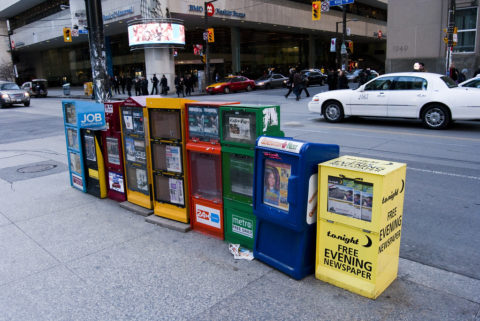
“Newspaper Boxes” by Randy Landicho is licensed under CC BY 2.0
We will hear a lot in the months ahead about who’s making money from news, so let’s get something straight: Even in the profit-soaked heyday of Canadian newspapers, no one made money from news.
That all ended about 100 years ago when radio — and then television — began delivering it for free.
Oh sure, the occasional ongoing news story would inspire people to buy more newspapers. But in my 30 years in that business the only event that did so in any significant way was the death and funeral of Princess Diana. Even then, after the extra cost of newsprint and distribution, the financial return was insignificant.
But mythologies die hard. People in newsrooms believed news made money — and apparently some still do — even when year after year, surveys of readers showed that there were lots of other things that sold and sustained newspapers.
Some people bought them because they were looking for a job. For others, it was a house, a plumber, a companion, a pet, a car or, really, almost anything else you can think of that might be needed. Classified pages were every town and city’s marketplace. That’s where you found stuff you had to get and bought an ad when you had something to sell or tell people about. It was where you announced the births of your babies, the graduations, engagements and weddings of your children and the deaths of your parents. The lives of communities were recorded in the classified pages of their newspapers.
After a glance at the headlines, many other readers’ first and sometimes only stops were the horoscope, comics, crossword (an error there generated far more calls than a rogue columnist ever could) and other pleasant distractions. For still more, it was the stocks listings, sports scores or recipes to which they were primarily drawn.
There were movie and entertainment listings — even a TV guide so you’d know where and when to find Seinfeld. On Thursdays, you might buy a paper just for the Canadian Tire flyer. On weekends, specialty sections discussed books and told tales of travel adventures well-supported by the latest deals advertised by travel agencies. Housing developers pitched their latest home designs in special real estate sections. And there were magazines. Honestly, there were.
It’s been literal decades since we last subscribed to a print newspaper, and nearly as long since I picked one up from a news stand. My mother is the last person I recall still depending on buying a physical newspaper — she only stopped buying a Saturday Toronto Star in the last year or so — but that was mainly for the TV listings. Back when I still occasionally travelled on business (also more than a decade ago, now), it was a nostalgic treat to find a copy of USA Today at the door of my hotel room in the morning.
February 11, 2021
Tom Brady’s Super Bowl success has outlasted many titans of corporate America
Despite the headline, this isn’t really about the NFL, Tom Brady or the S*per B*wl, it’s about a key factor in free market economies: creative destruction.
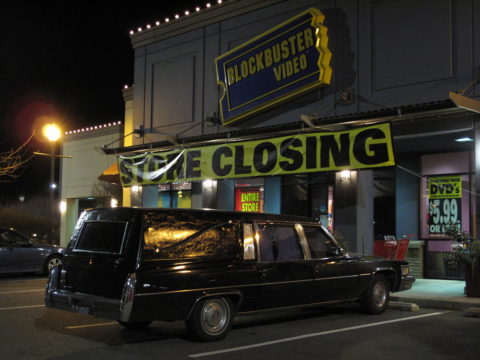
“Blockbuster store closing sale” by Consumerist Dot Com is licensed under CC BY 2.0
Consider some of the names that bought Super Bowl airtime during Brady’s first rodeo in January 2002: AOL, Blockbuster, Radio Shack, Circuit City, CompUSA, Sears, Yahoo, VoiceStream Wireless, and Gateway Computers.
The Titans of Yesterday
Notice a theme? That list features some companies we saw in Captain Marvel, the 2019 hit movie that nailed 90s nostalgia and reminded us how fast the world had changed. Like when Blockbuster Video stores were still a thing.
For those who may not recall, when Brady was winning his first Super Bowl, Blockbuster was approaching its peak. In 2004, it operated 9,094 stores and employed some 84,300 people. The company was pulling in $6 billion in revenue annually and looked invincible. Today, a single Blockbuster store remains open — in the world.
Remember RadioShack? Once upon a time, it seemed as if you could find one of their brick-and-mortar stores in every corner of the USA. Not anymore. In 2015, RadioShack filed for Chapter 11 bankruptcy, in large part because of those many store locations, which cannibalized revenues.
Sears, one of the historic giants of retail, managed to make it to 2018 before announcing its bankruptcy. Its stores continue to close so fast, it’s hard to tell how many remain in operation. (The best guess is about 60.)
It’s sometimes difficult to remember that the titans of industry aren’t always the same companies from year to year, and the sector-dominating company today might well be begging for a bailout (or demanding protection from uppity new competitors) only a few years down the way.
Some might see the collapse of Blockbuster, Sears and company as a sign of something terribly wrong with our economic system. After all, Blockbuster alone paid rent at tens of thousands of properties and employed tens of thousands of workers. Sears was the largest American retailer (by far) for decades.
Watching the companies we once shopped at flounder and fail can be surprising, jarring even. But a closer look shows this cycle is not unusual and is actually the sign of a healthy market economy, not a dysfunctional one. What may seem like pure destruction actually clears the way for economic innovation and renewal. “Creative destruction” is how the economist Joseph Schumpeter (1880-1950) characterized business failure in a free market.
As economist Mark Perry points out, companies on top have a very hard time staying on top. Perry, a scholar at the American Enterprise institute and a professor of economics at the University of Michigan’s Flint campus, compared the 1955 Fortune 500 companies to the 2019 Fortune 500. He found that just 52 were still on the list six decades later.
I spent most of my working career in the software business, and many of the companies I’ve worked for over the years aren’t in business any more (my first job out of school was with Northern Telecom … remember them?). Software is a particularly fast-cycling industry, but it’s true of the economy as a whole at a slightly more sedate pace.


